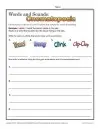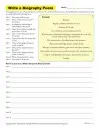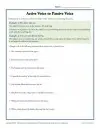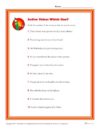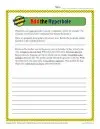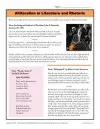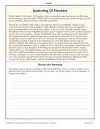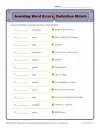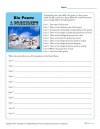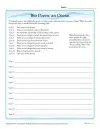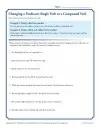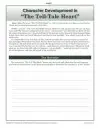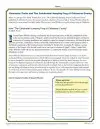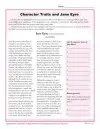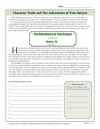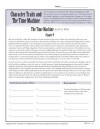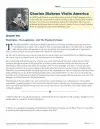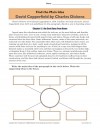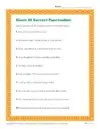Whazaam! It’s time for onomatopoeia!
Write a Biography Poem
Bio poems are usually short poems following a specific format. In this worksheet students will write a bio poem about themself.
Active Voice to Passive Voice
Here’s some practice for passive and active voice.
Active Voice: Which One?
Students will practice identifying active voice with this printable verbs activity. This worksheet asks students to read through the given sentences and circle the number of each sentence that is in active voice. Ideal for 8th – 10th grade, but can be used where felt appropriate. This activity can be used both at home and in the classroom by parents, teachers, or students.
Add the Hyperbole
In this worksheet your student will make a paragraph more interesting with hyperboles.
Alliteration in Literature and Rhetoric
Whether in lovely literature or rollicking rhetoric, alliterations are admirable!
Analyzing O! Pioneers
A passage from the classic novel “O! Pioneers” is the focus of this worksheet on citing text examples.
Avoiding Word Errors: Definition Match
Your student will match a word with its meaning in this worksheet. There are 12 questions, including words like anonymous, insure, adopt, unanimous and more.
Bio Poem: A President
Bio poems are usually short poems following a specific format. Students will write about a President in this worksheet.
Bio Poem: An Ocean
Have your students get creative by writing a bio poem about an ocean.
Change the Lyrics: Alliteration in the Twelve Days of Christmas
Given is a list of items in the classic Christmas carol “The Twelve Days of Christmas.” Seven of the days have an alliteration in the phrase. Change the items for the alliteration, but use an alliteration of the same letter.
Changing Verbs: Imperative and Interrogative
For each of the sentences, students rewrite it by changing an imperative sentence to an interrogative sentence and an interrogative sentence to imperative one.
Character Development in The Tell-Tale Heart
This worksheet uses Poe’s classic, “The Tell-Tale Heart” to help the student analyze aspects of a character.
Character Traits and The Celebrated Jumping Frog of Calaveras County
What do character traits tell us about a story? Students read a passage and determine character traits of different people.
Character Traits Worksheet – Jane Eyre
Students will read a passage from Jane Eyre and list 10 character traits of John Reed.
Character Traits Worksheet – The Adventures of Tom Sawyer
In this passage from Tom Sawyer students will list character traits of specific characters.
Character Traits Worksheet – The Time Machine
With this worksheet, students will read a passage from “The Time Machine” and list character traits from one of the characters.
Charles Dickens Visits America
In 1842 Charles Dickens was probably the most famous English language author in the world. In this year he visited America. Students read about the trip and answer the questions.
Charles Dickens: David Copperfield and His Aunt
Charles Dickens’ David Copperfield, published in 1849, is one of his most famous works. Students read the passage and answer questions.
Circle It! Correct Punctuation
Students will practice identifying correctly used punctuation in this printable activity. They will be asked to read through the given sentences and circle the number of the sentences that have correct punctuation. Ideal for 6th – 12th grade, but can be used where needed.
